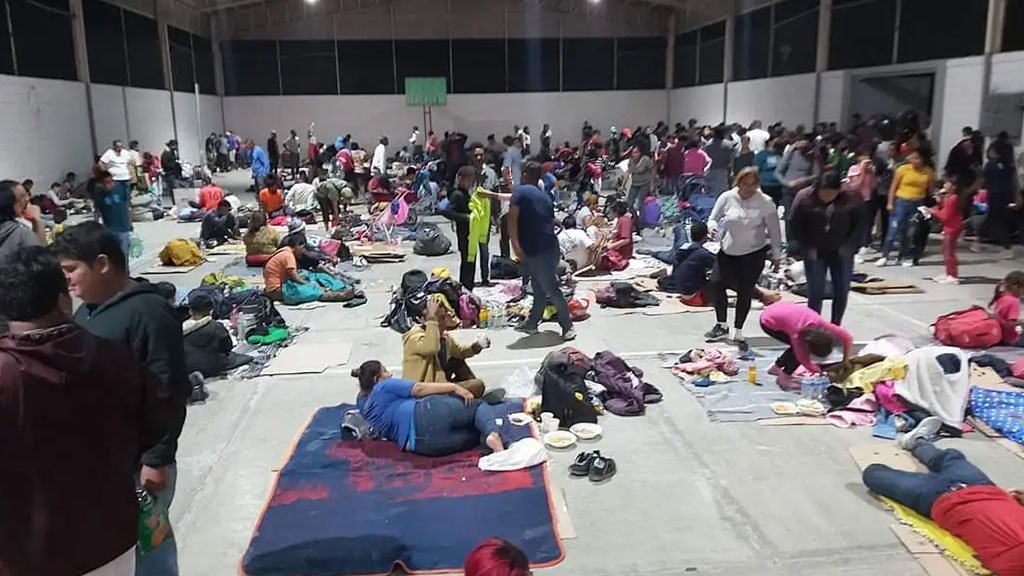Caravan of up to 1,500 migrants headed to border stopped in Chihuahua

By Rocio Gallegos and Veronica Martinez / La Verdad
CIUDAD JUAREZ – En route to the United States, a caravan of migrants from Central and South America arrived in the state of Chihuahua this week, where state authorities have blocked their passage at the city of Jiménez to prevent them from reaching the border.
There are up to 1,500 migrants in the caravan, Chihuahua state government officials said in a statement issued Thursday in which they assure they will "retain" the migrant caravan in Jiménez, a small city south of Chihuahua City. State officials have also asked the Mexican federal government to review the immigration status of the migrants and their possible return to their home countries.
The caravan comes just weeks before Title 42, a U.S. public health law that has mostly barred asylum at the southern border and allows for the swift removal of migrants, is to be lifted on Dec. 21.
The Biden administration this week said it will appeal a federal court ruling that would end the asylum restrictions under Title 42, but there’s no clear indication the appeal would impact the deadline. A second case involving the legality of Title 42 playing out in the courts may impact that restriction, but local governments and nonprofits on both sides of the border are bracing for what could be a massive influx of migrants.
El Paso has already seen nearly 2,000 migrants released to the streets over the last month as shelters are at capacity. The migrants have been processed and allowed to remain in the U.S. to await their immigration hearings.
The caravan & the Mexican national guard
The migrant caravan arrived in Chihuahua in cars and cargo trucks, while some walked. Men and women – some of them pregnant – as well as adolescents, children and even newborns are part of the caravan, according to reports. They are from Cuba, Guatemala, Honduras, El Salvador, Nicaragua, Venezuela, Colombia, Panama and some southern states of Mexico, the news organization El Sol de Parral reported.
Chihuahua Gov. Maru Campos said she was informed the caravan was approaching the state, heading to Ciudad Juárez. She denounced the Mexican national guard for accompanying the migrants.
"The migratory flow cannot be opened, and there is no support for migrants in Ciudad Juárez. This affects the people of Juárez," she said.
"Right now, between 1,200 to 1,500 migrants are coming through Jimenez in the south of the state, guarded by the federal government. There is no more space in the shelters. If they arrive in Ciudad Juárez, we will look out for them. But we are urgently calling on the federal government for help,” Campos said.
The national guard responded that they are not transporting migrants, only monitoring their march because they were victims of a crime and want to avoid them being kidnapped again.
The migrants were allegedly kidnapped in the Quinta Santa Simona in Gómez Palacio, according to police from Mapimí in the state of Durango, where the migrants were treated and provided food. They were then transported in official Mapimí vehicles to the border area with Chihuahua so that they could continue their journey to the northern border, according to reports.
Overcrowded shelters
Shelter managers in Juárez said they don’t have enough space to house the migrants, including the network Somos Uno Por Juárez, which is currently serving about 1,900 people in 15 shelters, coordinator Rosy Mani said.
Mani calculates that there are between 400 and 500 spaces available in the different shelters, but if more is required, it will fall on the federal, state and municipal authorities to find solutions.
The municipal shelter located in the Enrique 'Kiki' Romero Gymnasium has a capacity of 250 people, and on Thursday it was half full, said Santiago González Reyes, director of the Juárez’s Human Rights Directorate.
Other humanitarian organizations such as the San Columbano Ministry have begun activities to reopen an additional shelter to welcome the Venezuelan community, said its coordinator, Cristina Coronado.
El Paso Matters assistant editor Cindy Ramirez contributed to this report.
This article first appeared on El Paso Matters and is republished here under a Creative Commons license.![]()

